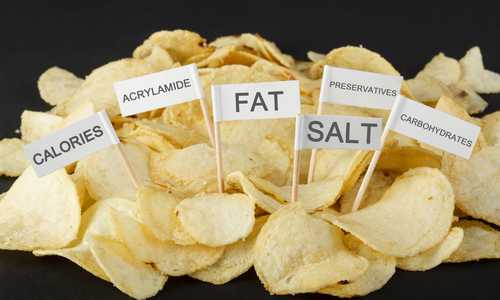Processed Food Addiction And Mental Health | Part 2

Issue No. 45 | Brought to you by the Addiction Reset Community – ARC
Unlocking the secrets of processed food addiction and guiding you to find freedom from food and weight obsession.

21 Sources of Depression & Anxiety
Processed foods are highly addictive drug-like substances that can alter the brain.
Studies reveal that rats choose sugar and saccharine over cocaine and heroin. The morphine in gluten attaches to the same receptors as opium. The syndrome of withdrawal from excessive salt is the same as withdrawal from drugs. Dairy contains four different kinds of natural morphine. Processed fats light up the same part of the brain as marijuana. Caffeine activates dopamine. Who knows what 15,000 different food additives actually do?

In the next three issues of this newsletter, we will explore 21 sources of anxiety and depression and how each one is aggravated by processed foods. We will also highlight how the Addiction Reset Community can support your recovery from depression and anxiety by addressing each of these sources.
21 sources of depression and anxiety:
- Brain Chemicals
- Collapsed reward pathways
- Unstable blood glucose
- Isolation
- Trauma
- Inflammation
- Caffeine
- Media
- Medications
- Medical advice
- Therapy
- Gut/brain connection
- Finances
- Weight-loss
- Starvation
- Relationships
- Jobs
- Chronic illness
- Problem-solving
- Children
- Sleep
- Brain Chemicals
Processed Foods elevate depression and anxiety by triggering brain chemical responses. They stimulate the release of adrenalin, the “flight/fight hormone” which can lead to feelings of fear or anger.
The Addiction Reset Community offers tools and support that will help you to identify, eliminate and abstain from processed foods that cause you artificial stress and aggravate depression or anxiety.
- Collapsed Reward Center
Processed foods initially overstimulate the pleasure pathways in the brain, but over time, this overstimulation leads to the collapse and downregulation of pleasure. So on the one hand, processed foods induce artificial stress and on the other, they minimize the ability to feel good. We experience this as anxiety and depression.
The Addiction Reset Community provides support to abstain from the foods that have caused the collapse of pleasure due to overstimulation. As pleasure receptors recover, members begin to experience feelings of pleasure and satisfaction from their healthy food choices once again.
- Unstable blood glucose
Processed food destabilizes blood glucose. Refined carbohydrates, in particular, get into the bloodstream quickly and elevate blood glucose to dangerously high levels. The responding spike in Insulin causes a crash in blood glucose and can result in feelings of panic.
The Addiction Reset Community provides tools to assist members to rotate foods to monitor the impact of blood glucose and make adjustments that best suit them.
- Isolation
Chronic processed food use creates fatigue, limited mobility and changes in body shape, which can all lead to isolation and self-stigmatization. Depression and anxiety are aggravated by disconnection and self-loathing.
The Addiction Reset Community provides a kind, welcoming, compassionate environment where members can connect and share their thoughts and feelings freely. ARC members are nurtured to feel safe and accepted and develop a stronger sense of self-value and belonging.
- Trauma
Processed foods are associated with trauma. They make people around us irritable and unstable. For example, parents who use processed foods chronically, often experience anger and raging, causing immense emotional, mental and sometimes, physical, trauma, for their children. Our trauma memories are a source of anxiety and depression, which are amplified by the brain’s chemical response to processed foods.
The ARC uses effective tools and exercises to support members as they process and reframe traumatic memories in a kind, compassionate environment. Immersion in the ARC and practicing ARC exercises can help to hardwire new thoughts that are uplifting and resilient against trauma memories.
- Inflammation
Processed foods cause inflammation and oxidative stress which interferes with the brain’s ability to produce Serotonin production. This is the neurotransmitter responsible for feelings of satisfaction. In the absence of processed food, Serotonin levels rise and feelings of satisfaction and contentment return.
The ARC provides members with tools to identify and rotate foods in order to o eliminate those that are interfering with Serotonin. Members are encouraged and supported to move at their own pace through the food rotation and elimination process.
- Caffeine
Processed foods promote caffeine use. Various processed foods contain caffeine which blocks the calmness function in the nervous system, directly promoting feelings of anxiety. Caffeine also interrupts sleep, contributing to daytime fatigue and inability to concentrate, leading to increased use of caffeine, and in turn, increased anxiety and panic.

The ARC supports members as they taper caffeine use and get through the physical and emotional effects of withdrawal.
… to be continued in the next issue.

Within the Addiction Reset Community (ARC) our members and their journeys are important to us. We find their stories inspiring and hopeful for everybody in health recovery.
“It’s not been long since I joined the ARC and have had such a powerful few weeks already! I joined my 2nd check-in and study group today and had an incredible moment during it while reading through Chapter 18 of the textbook. I’d never seen the link with something I’d regularly experienced as a child by how a loved one’s own addictions were impacting me and my siblings so negatively. Suddenly dots were connecting all over. Did I cry while sharing? Yes! Did I feel safe to do so? Absolutely! It was so incredible to be able to share so openly and have the group hold space for me. I came away feeling like something inside shifted and I’m so grateful! These sessions together are so, so important and I cannot wait till the next one! Thank you, dear friends, especially those who were there today.”

Many people reach out to Joan asking for advice and assistance on how they can begin their recovery journey.
Dear Joan:
High blood pressure runs in my family. My grandfather had numerous strokes before he passed and my father has been on medication since his 40s. When I started a clean food plan, my blood pressure was bordering on needing medication to control it. However, once my clean eating was established, my blood pressure returned to normal levels. Is there a link between processed foods and high blood pressure?
Joan responds:
Firstly, let me congratulate you on improving your health with a clean food-eating plan. That is a fantastic accomplishment!
While I am not a Medical Doctor and cannot provide direct medical advice, I can certainly confirm that there is sufficient scientific research that shows that processed foods cause high blood pressure. When you remove processed foods from your diet and follow a “clean foods” meal plan, you can push back against the traditional idea that you will be on medication for high blood pressure for the rest of your life.
Recovery from processed food addiction is possible and can have a lasting, positive impact on your health overall.
DISCLAIMER:
Dr Joan Ifland (PhD) is a global expert on the subject of processed food addiction and is not a medical doctor. Information and response shared in this Newsletter are not intended for, and should not be construed as medical advice.
Do you have a question? Reach out to us with your questions about food addiction and recovery at gethelp@foodaddictionreset.com
Are you showing signs of Processed Food Addiction? Take this self-quiz to find out now!
Recent copies of Dr Joan Ifland's Blog:
Issue 01 | Issue 02 | Issue 03 | Issue 04 | Issue 05 | Issue 06 | Issue 07 | Issue 08 | Issue 09 | Issue 10 | Issue 11 | Issue 12 | Issue 13 | Issue 14 | Issue 15 | Issue 16 | Issue 17 | Issue 18 | Issue 19 | Issue 20 | Issue 21 | Issue 22 | Issue 23 | Issue 24 | Issue 25 | Issue 26 | Issue 27 | Issue 28 | Issue 29 | Issue 30 | Issue 31 | Issue 32 | Issue 33 | Issue 34 | Issue 35 | Issue 36 | Issue 37 | Issue 38 | Issue 39 | Issue 40 | Issue 41 | Issue 42 | Issue 43 | Issue 44


